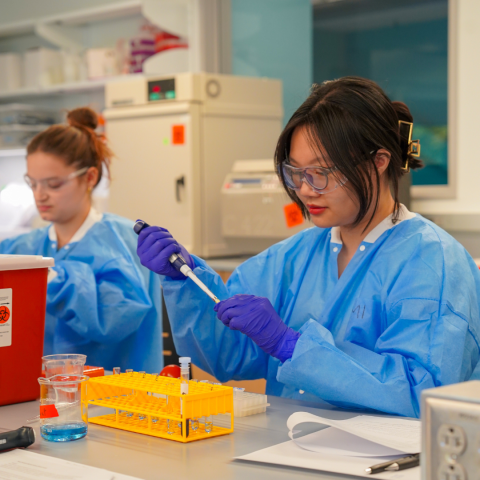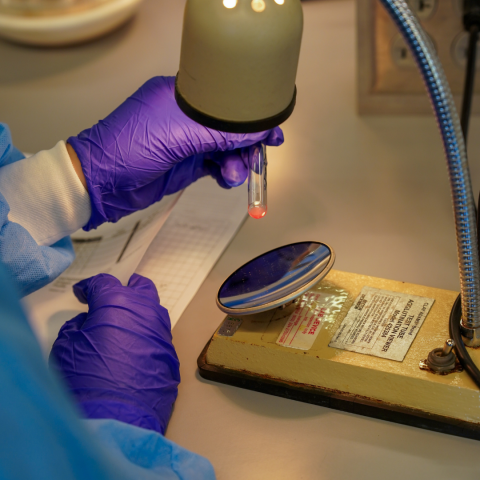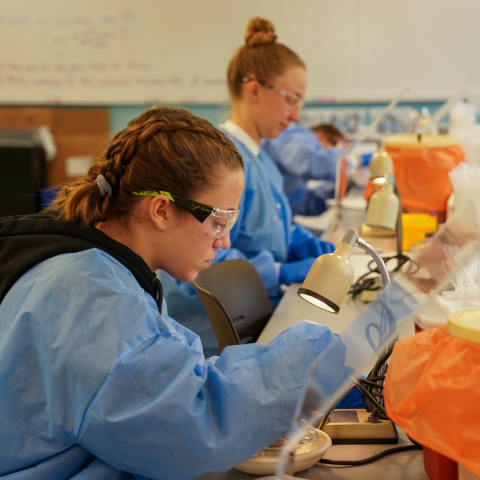What Does a Medical Laboratory Scientist Do?

Medical laboratory scientists play a critical role in healthcare, using their expertise to analyze biological samples and aid in the diagnosis and treatment of diseases. Beyond performing tests, their work demands precision, problem-solving, and a commitment to delivering accurate results that can shape a patient’s treatment plan.
This rewarding career begins with a strong educational foundation, typically a four-year bachelor’s degree in clinical or medical laboratory science. Institutions like the University of New Hampshire’s College of Life Sciences and Agriculture (COLSA) offer a unique opportunity to not only gain essential knowledge but also solve real-world problems through hands-on learning and cutting-edge research. At COLSA, you’re not just preparing for a career—you’re making an impact on the future of healthcare.
Roles and Responsibilities of Medical Laboratory Scientists
Medical laboratory scientists perform vital tasks that help doctors diagnose and treat patients. Their work involves analyzing biological samples, conducting diagnostic tests, and maintaining lab equipment.
Medical laboratory scientists perform tasks vital to patient care, including analyzing samples, conducting diagnostic tests, and maintaining equipment.
Analyzing Blood and Biological Samples
Using advanced techniques and equipment, medical laboratory scientists analyze blood, tissues, and other samples. Their findings help identify diseases like cancer and diabetes, providing critical data for doctors to develop treatment plans. Programs like COLSA’s biomedical science major ensure students gain the expertise needed to excel in this high-stakes field.
Conducting Diagnostic Tests and Reporting

Scientists work with various samples to detect illnesses and monitor health conditions. Communicating results requires clear, concise reporting skills. At UNH COLSA, students hone these abilities in collaborative learning environments.
Quality Control and Equipment Maintenance
Medical laboratory scientists oversee equipment maintenance and quality control programs to ensure reliable, accurate test results. This responsibility reflects COLSA’s commitment to precision and safety in scientific practice.
Educational Path to Becoming a Medical Laboratory Scientist
A career in medical laboratory science begins with the right education, certification, and opportunities for specialization.
Required Education and Degrees
A bachelor’s degree in biomedical science, like UNH’s Medical Laboratory Science Option, provides the foundation for this career. At COLSA, students benefit from nationally accredited programs that prepare them for certification and success.
Certification and Licensure
Certification from organizations like the American Society for Clinical Pathology (ASCP) is typically required, demonstrating professional expertise. A rigorous education, like that offered at COLSA, equips students to meet these requirements with confidence.
Specialized Training and Continuing Education
Advances in technology require ongoing learning and specialization. UNH’s emphasis on research and innovation ensures graduates are prepared for evolving challenges in the field.
Undergrad
UNH has 12,800+ undergrads on campuses in scenic Durham and urban Manchester. Find out what it takes to join the Wildcat family. UNH has 12,800+ undergrads on campuses in scenic Durham and urban Manchester. Find out what it takes to join the Wildcat family.
Medical laboratory scientists have diverse career options in healthcare facilities, public health, and research.
Healthcare Facilities and Laboratories
Hospitals and clinics rely on medical laboratory scientists to deliver timely, accurate test results. These fast-paced environments demand strong problem-solving skills and attention to detail.
Contributions to Public Health and Research

In public health labs and research institutions, medical laboratory scientists tackle larger challenges like disease outbreaks and environmental hazards. At COLSA, students engage in projects addressing pressing global issues, preparing them for impactful careers.
Job Stability and Advancement
The demand for medical laboratory scientists continues to grow, driven by advances in healthcare. COLSA emphasizes professional development, helping graduates seize opportunities for leadership roles or specialized fields.
Skills for Success as a Medical Laboratory Scientist
Medical laboratory scientists need technical, analytical, and interpersonal skills to excel.
Attention to Detail and Problem-Solving
Precision is critical in this field. COLSA’s programs prepare students to tackle real-world challenges with a meticulous and proactive approach.
Communication and Teamwork
Collaboration with healthcare professionals and clear communication of test results are essential. UNH’s interactive learning environments help students develop these key skills.
Technical Proficiency
Mastery of laboratory equipment ensures accurate results. COLSA’s facilities provide hands-on experience with the latest tools and technologies.
The field is evolving rapidly, with advancements like digital pathology and molecular diagnostics enabling faster, more accurate results. UNH COLSA equips students to embrace these innovations, preparing them for a career at the forefront of healthcare.
A career as a medical laboratory scientist offers the opportunity to make a tangible impact on healthcare through precision, innovation, and collaboration. With programs like those at UNH COLSA, you’ll gain the knowledge, skills, and support needed to thrive—while contributing to advancements that improve lives worldwide.





